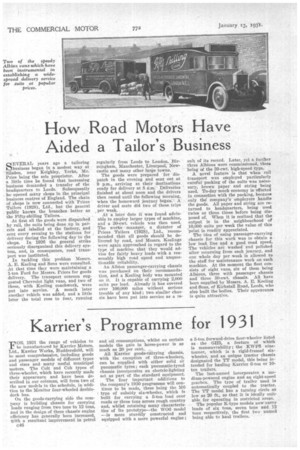How Road Motors Have Aided a Tailor's Business
Page 68

If you've noticed an error in this article please click here to report it so we can fix it.
SEVERAL years ago a tailoring business began in a modest way at Silsden, near Keighley, Yorks, Mr. Price being the sole proprietor. After a little time he found that increasing business demanded a transfer of the headquarters to Leeds. Subsequently he opened many shops in the principal business centres of England. The chain of shops is now connected with Prices Tailors (1928), Ltd., but the general public knows the branches better as
the Fifty-shilling Tailors. • At first all the goods were dispatched by rail, the suits being done up in parcels and labelled at the factory, and sent every evening to the stations for delivery during the following day to the shops. In 1926 the general strike seriously disorganized this delivery system, and, in consequence, road transport was instituted.
In tackling this problem Messrs. A. E. Keeling and Sons were consulted. At that time they were maintaining a 1-ton Ford for Messrs. Prices for goods delivery. The transport concern suggested Chevrolet light vans, and two of these, with Keeling coachwork, were put into service. A month later another vehicle was added, and a little later the total rose to four, running regularly from Leeds to London, Birmingham, Manchester, Liverpool, Newcastle and many other large towns.
The goods were prepared for dispatch in the evening and sent out at 9 p.m., arriving at their destinations ready for delivery at 8 a.m. Deliveries finished at about noon and the drivers then rested until the following morning, when the homeward journey began: A' driver and mate did two of these trips per week.
At a later date it was found advisable to employ larger types of machine, and a 30-cwt. vehicle was then used. The works manager, a director of Prices Tailors (1928), Ltd., recommended that all goods should be delivered by road, and Messrs. Keelino were again approached in regard to the type of machine that they would advise for fairly heavy loads with a reasonably high road speed and unquestionable reliability.
An Albion passenger-carrying chassis was purchased on their recommendation, and a Keeling body was mounted on it It is capable of carrying 2,000 suits per load. Already it has covered over 100,000 miles without serious trouble of any kind ; two similar chassis have been put into serviceas a re
suit of its record. Later, yet a further three Albions were commissioned, these being of the 30-cwt. high-speed type.
A novel feature is that when rail transport was employed particularly careful packing of the suits was neeessary, brown paper and string being used. To-day much economy is effected in connection with the packing, because only the company's employees handle the goods. All paper and string are returned to headquarters, being used twice or three times before being disposed of. When it is realized that the output is in the neighbourhood of 10,000 suits per week the value of this point is readily appreciated. The idea of using passenger-carrying chassis for this -work vvas to obtain a low load, line and a good road speed. The vehicles are washed and polished after returning from each journey, and one whole day per week is allowed to the staff for maintenance work on each machine. At the moment the fleet consists of eight vans, six of them being Albions, three with passenger chassis and three 30-cwt. chassis. All have been supplied by Messrs. A. E. Keeling and Sons, of Kirkstall Road, Leeds, who also built the bodies. Their appearance is quite attractive.












































































































